#Wood & Pickett
Explore tagged Tumblr posts
Text



Cozy cabin in the woods before all of the holiday rush.
12/22/24
My photos
4 notes
·
View notes
Photo


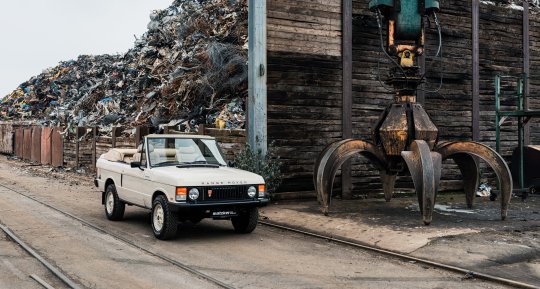







Range Rover Goodwood (tailor-made by Wood & Pickett).
While the Range Rover has always been the 4x4 of choice for royals and industrials alike, sun-loving jetsetters were missing an open-top version for their tropical hideaways. Luckily, London-based coachbuilders Wood & Pickett solved that problem in bespoke quality and style. Luxury SUVs are common as muck these days, but if we were able to engage reverse gear and back-up 40-odd years there was really only one to choose from – the legendary original Range Rover now known as the ‘Classic’, and they don’t come much more ‘Classic’ – or rare – than this superbly restored and thoughtfully resto-modded convertible that, for our money, effortlessly outclasses anything similar being made today.It’s true that Mercedes-Benz had its G-Wagen and Jeep its Wagoneer back in the ‘80s, but the former was more utilitarian than the Range Rover and the latter simply far less chic. But while the Rangie might already have been widely regarded as truly ‘the best four by four by four by far’ there were plenty of people who wanted one that was more than a bit different from the regular production model.Solihull’s bosses discovered this for themselves in 1980, when a one-off prototype designed to test the viability of an ‘ultra luxe’ Range Rover was loaned to Vogue magazine as a prop for a Biarritz fashion shoot. When the images were published, as many enquiries were received about the car as about the Jaeger clothes and Lancome perfume that the shoot was intended to promote – and so an initial run of 1,000 ‘In Vogue’ special editions was produced.The prototype had been created by London’s Wood & Pickett which was established 20 years earlier by former Hooper coachworks craftsmen Bill Wood and Les Pickett. The firm initially made a name for itself by adding luxurious and expensive upgrades to Minis, work that initially attracted the attention of celebrities such as Rolling Stone Mick Jagger and later that of the Middle East’s super-wealthy oil sheiks. To them, however, small was not always beautiful. More often, they wanted large, and the larger and more expensive the better. So in their eyes, the names ‘Wood & Pickett’ and ‘Range Rover’ went together like a horse and carriage.
Soon, W & P (along with similar outfits such as Vantagefield, Glenfrome, Monteverdi and Rapport) was doing a roaring trade in Range Rover upgrades, making the most of the cars’ boxy shape and separate chassis to create everything from stretched limousines to Rangies designed for going on shoots and safaris and for carrying polo kit and elaborate picnic sets.The Wood and Pickett cars were among the most accomplished, and the firm’s managing director Eddie Collins (formerly the marketing boss of rival Mini customiser Radford) was a smooth talker who could probably sell sand to the Arabs. But instead he sold them convertible Range Rovers – capitalising nicely on the fact that cash-strapped British Leyland (the then owner of Land Rover) couldn’t afford to design and make a soft-top of its own. Most of the history of this Wood & Pickett Range Rover convertible has been lost in the mists of time, but if its early years were spent travelling through the desert in style it must have taken a wrong turn along the way – because it ended-up on a run-down housing estate in Poland where it was discovered by the current owner around a decade ago.Although still in its original coat of Range Rover ‘Masai Red’ , the car was in a decidedly sorry state. Its electric roof, torn and holed, had allowed rainwater to soak the interior, ruining everything from the plush velour seats to the once-gleaming wooden trim. Its original 3.5 litre, carburettor-fed engine had been replaced with a fuel injected lump that was running rough, and the prospect of the car ever taking to the road again seemed slim.Once acquired, the car was shipped to Germany where it was stripped to its bare bones in order for a ground-up restoration to commence – a project that turned out to be a considerably larger task than expected. In fact, it took more than eight years – plus the purchase of an additional, four-door donor car - to transform the original, badly neglected relic into what you see here: a classic Range Rover convertible like no other.
Although still instantly recognisable as one of Wood & Pickett’s two-door ‘Goodwood’ conversions, it has been given something of a safari look thanks to its immaculate coat of Rolls-Royce ‘Fenland Sedge’ paint, colour-coded Vogue wheels and the perfectly tailored fawn convertible roof (that once again retracts effortlessly at the touch of a button). All-new interior trim in biscuit leather continues the safari/desert theme, while freshly burnished woodwork and a Moto-Lita steering wheel enhance the overall feeling of quality.
43 notes
·
View notes
Text










American Civil War: The final day of the Battle of Gettysburg culminated with Pickett's Charge on July 3, 1863.
#McPherson's barn#Devil's Den#Chambersburg Pike#Little Round Top#USA#Gettysburg National Military Park#Pennsylvania#travel#summer 2019#American Civil War#original photography#US Civil War#Battle of Gettysburg#final day#Pickett's Charge#3 July 1863#anniversary#US history#vacation#landscape#countryside#flora#nature#woods#cannon#landmark#free admission#tourist attraction
6 notes
·
View notes
Text
1 note
·
View note
Text

























tag the oc that has an intuition that is rarely or never wrong
#Gabriella Lupei#Aishlynn Selena Zoe Hartwig#Lina#Samuel Cullman Thompson#Sam#Odette Coraline Lupei#Ronan McKinney#Sebastian Bloodsworth#Skoll Ulfr#Hati Ulfr#Juniper Thompson Sinclair#Nekaya D'Angelo#Kaya#Nekaya#Evindora Lupei#Eonan McKinney#Raven McKinney#Brandubh McKinney#Echo Thompson Blackwood#Stanley Pickett#George Cullman#Clementine Blackwood Thompson#Mercury Jinx#Niyol Chee#Oak Woods#Ragnall McKinney#Wallace Patton#Katherine Cullman
125 notes
·
View notes
Photo

Phoenix Pool Inspiration for a massive, contemporary, rectangular, and concrete pool renovation in the backyard
#greey pickett#desert landscape#wood panel ceiling#pool#russ greey#landscape architecture#pool lounge chair
0 notes
Photo

Pantry Kitchen in Boston
#An enormous transitional u-shaped kitchen pantry design with a medium tone wood floor#an undermount sink#beaded inset cabinets#white cabinets#quartz countertops#blue and glass tile backsplashes#stainless steel appliances#an island#and white countertops is an example. blue picket tile#hot water tap#picket tile#pickett tile#picket tile backsplash#brizo faucet
0 notes
Text

Mini Margrave by Wood & Pickett 1990. - source RM Sotheby's.
66 notes
·
View notes
Text
This rant I'm about to go on will probably not even get noticed, but, I genuinely do not care.
I just want to take a solid few minutes to really praise Will Wood and how...intellectual and meaningful his lyrics are. I know that's probably obvious to a lot of other WW fans already, but his music has been causing me actual brainrot and I can't stop putting his albums on repeat, ESPECIALLY The Normal Album, and I can't and won't shut up about it.
(Heads up, this is simply a take of mine on The Normal Album that I've been really wanting to talk about. I am by no means disclosing that what I am about to say is objective and/or true. You may politely correct me or respectfully counter it with your own opinions/thoughts, but kindly remember, this is just me mindlessly blabbering about how much the album means to me, how the little details make up my theory for the album's theme/point, and just me fangirling over the thought he put into his music.)
Alright I'm gonna go out on a limb here and essentially just explain my Normal Album theory I compiled by making the most logical connections and assumptions based off the album's lyrics and certain song's context(s) from the album.
To me, The Normal Album is an ironic, satirical juxtaposition testing "normal" people's reactions to "hush hush" topics of conversation, or things we don't typically think/talk about that aren't considered "normal" at all. Not only that, but also how the little bits and pieces from different songs and lyrics from the album make up said theme, is just so astounding to me. It truly shows that he put a lot of thought into his work and you can tell some of the songs are hitting just as close to home for him as it does with a lot of fans who look really into it.
To further emphasize, notice how the first song of The Normal Album, "Suburbia Overture / Greetings from Mary Bell Township! / (Vampire) Culture / Love Me, Normally," the first name and part(?) of the song is literally starting with "Suburbia?" Suburbia is often known as a neighborhood that appeals as a peaceful, cookie cutter place to live or the collective standard people envision as to what "normal" people should act like or how if you really are "normal," this is how you should live your life; a shiny, happy family, white pickett fences, perfectly cut grass, etc. Suburbia also (stereotypically) expresses resentment anyone that does not fit their standard of "normal," and I think that's Will's entire point, not only expressed in this song in particular, but the entire album. He is testing the waters by presenting this as an exaggeratedly normal album on the surface, but the further you get into it and/or dive into the lyrics, it becomes evident this is not normal at all. Just like how modern, suburbian culture (that he very explicitly expresses that he despises (e.g, "fuck your culture," "culture is not your friend")) presents itself as normal, even though behind closed doors, we know there is most likely something that is not okay, or something going on that contradicts the suburbia's own self-established standard of normal.
Hell, even the album cover is Will wearing "normal" suburbia-esque attire, waving out a window with a smile on his face, presenting as the normal he very much opposes with this album's music. This enhances the theme because of how much its trying to look normal on the cover; only ironically portraying Suburbia as too good to be true even more. And this is only the first of many symbolic details found within the album. With the ironic title, plus this sense of imagery, who wouldn't think it wasn't normal? (but if you know Will Wood and/or look at the titles, then you know damn well this album is far from it.)
By showing us something normal on the cover and starting off the album with a song who's title's first word is "Suburbia," it unveils itself to be ironic yet symbolic, reflecting suburbian attitude and showing how these kinds, and plenty of other people, treat what should be considered important topics (identity, death, morality, mental health, etc.) as things to be swept under the rug because it was not integrated into their "normal" ideals, through its music and words.
For example, to help even further prove my point, just look at some of the lyrics/song titles:
·"It's only culture, and its more afraid of you than you are of it." - That right there, that right there is his entire thesis that sums up his point of the album, along with my theory. Anything different opposing "normal" culture, the same culture grows a fear of it, often times trying to silence it out of fear of losing control of or entirely losing the "normal" haven/standard that has been created and set. Will bringing up the topics he does within the album does this very thing, destroying the "normal" feeling that had been set at the beginning, along with revealing the album's lack of hesitancy to discuss tough topics, the undertones of its true nature, and shining a light on how the album is ironically not normal at all.
·"I/Me/Myself" - A song that plays into the themes of not only identity, but the same themes of normality and conformity by discussing how both cis and trans people have their idea of normal towards labels and how one should act according to theirs and are both capable of projecting it in a toxic manner that tries to push down anything that defies it. Will Wood LITERALLY wrote and explained how this song is talking about his experiences as someone who used to be a genderqueer person, how both people on each side of the gender spectrum tried telling him that he can't do xyz because he's a cis man/genderqueer person (or in general), his frustrations with said standards, and that he only wore his gender identity as something to serve a purpose. Just because your behavior, interests, or whatever, contradicts your birth gender, it does not mean you have to conform to labels on either side, even if its not "normal" to everyone telling you otherwise. This very thing also exemplifies how this aforementioned culture is "not your friend" and that it can and will very much push down its standard of normality down your throat, no matter how good it seems or what side its on.
·"Marsha, Thankk You for the Dialectics, but I Need You to Leave" - Like "I/Me/Myself," this song also presents two (most likely extremist) sides that have their own standard of "normal," but this time, it discusses mental wellness instead. Regarding the fact this song revolves around themes of mental health and the balance of how it should be treated, we are given two (or possibly several more) perspectives on the subject matter that could each be considered normal, depending on the evironment/generation. (E.g., we hear a side throughout the song that seems to oppose professional/medical help in this regard or leans away from heavy reliance on such things (e.g., "Back in my day we didn't need no feel good pills and no psychiatrists, we just drank ourselves to death/bled out in our bath," "A little identity never hurt nobody, but lately you've been focusing too much on yourself," etc). And then, we also hear a side that is also consistent throughout the song, seemingly the polar opposite (e.g., "Better safe than sorry, and we both know the danger," "And a little conformity never hurt nobody, but lately I've been worried that you're losing yourself," etc.) (This one is kinda loosely tied, but I still thought it played into themes similar to I/Me/Myself in terms of normality, sorry if it doesnt make too much sense)
·"Well this disease is defined by its treatment, you people make me sick!" - This bit from Outliars and Hypocrates helps emphasize the album's theme further due to the song itself (theoretically) being about human behavior and this lyric also showing how these "normal" people may treat anything different negatively, creating issues within the person who appears as different and making them think something is wrong with them, potentially forcing the person to conform in order to avoid being ostracized (further creating and pushing the established "normal" expectations). Thus, creating a "disease" that is not at all a disease, and merely just behavior that is only treated as such because it does not fit the metaphorical and literal suburbia's standard or ideals of "normal."
I could go on and on, but I have been typing for way too long at this point (my hands and brain are actually hurting, help- VHKDFJ). There are plenty of other lyrics and songs I want(ed) to integrate in this post, but as I just said, I'm very tired from writing all this, and besides, I think I've made my point/theory clear. Whether I'm correct (partially or fully) or not, this was still fun to talk about, and trust me I have so much more praise for this man and his work and I got plenty of more speculations as to what some of his other songs could mean. Maybe I'll make more posts on it sometime in the future, but who knows?
And again, I cannot stress this enough, please do not harrass me for this and if you do believe otherwise, please reply respectfully. I know some, if not most people are nonchalant at the least about this kinda stuff, but I do NOT wanna deal with any comments or replies I know I could possibly get that'll be going "Erm, Actually-" or getting pissed at me for having an opinion. I am in no way claiming my postulation is definitivelty correct, these are just MY theories and MY thoughts. If you have anything different to say or your own theories about The Normal Album, or just any of WW's music in general, I would love to hear them in a respectful manner and/or your reasons for why you think xyz about the album(s).
I just had to rant about how truly incredible Wood's choice of words and music were for the album. The theme is truly very astounding, but just the pieces in the words and titles that make up the puzzle, is what it makes it even better. It is just so well thought out and amazing to me. Will Wood is one of the most lyrically intlligent, and seemingly passionate artist's that I've ever seen. If you dont like his music or have never even heard of him, at least read more analytical posts like this just so you can get a taste, and/or at the least, appreciate how absolutely profound Will is with his lyrics. My compliments and explainations for his work do not do it justice. It is just something you have to listen to for yourself. His content just cannot be put into a box by words.
#rant post#rant#will wood and the tapeworms#will wood#holy shit im not typing anything for the next month 💀#that took way too long (ADHD be damed) and my hands are now in agony (it was worth it tho)#just a theory#just a thought i had#im proud of this one#just my thoughts#i am so ill for ww and his music 😭#please read (only if you want to)
25 notes
·
View notes
Text

Edward Lee Floyd (born June 25, 1937) is a soul-R&B singer and songwriter, known for his work on the Stax record label including the #1 R&B hit song “Knock on Wood”.
He founded The Falcons, which also featured Mack Rice. They were forerunners to future Detroit vocal groups such as The Temptations and The Four Tops. Their most successful songs included “You’re So Fine” and when Wilson Pickett was recruited into the group as the lead singer, “I Found a Love”. Pickett then embarked on a solo career, and The Falcons disbanded. #africanhistory365 #africanexcellence
4 notes
·
View notes
Text
The lost cause of British conservatism is like the lost cause of the US Confederacy. Myth-making and evasion dominate the writing of Conservative intellectuals just as they dominated the self-justification of the defeated American south.
To Confederate sympathisers the south did not lose because it was defending slavery. The southern states were a victim of an attack on their rights by the north, a position still maintained today by Nikki Haley and other right-wing politicians seeking southern votes.
Equally, today’s Conservative writers insist that they are not going down to a potentially catastrophic defeat because Conservatism betrayed the UK by imposing Brexit, Boris Johnson and Liz Truss on a country in no condition to take any of them.
No, the right is losing because it is not right-wing enough.
It feels mean to pick out examples when there is so much special pleading to choose from. But as readers need evidence, here is the pro-Brexit historian Robert Tombs (an old friend of this Substack).
Writing in the Telegraph Tombs says that the Tories “have lost much of their middle-class vote and their working class vote too”. So they have. But Tombs hastens to add, not because of Brexit being a disaster, or Johnson turning Downing Street into a pub, or unfunded tax cuts for the wealthy but because along the way the Conservatives embraced policies that Tombs and the Telegraph don’t like.
“High taxes, mass immigration, projects like HS2 and hasty attempts to impose net zero”.
There is no need for right-wingers to ask hard questions of themselves. They weren’t wrong. They were betrayed by cowardly politicians and the civil service.
Henry Hill, the deputy editor of Conservative Home, who was writing in the Guardian this week, exemplifies the determination of modern Conservatives to avoid a reckoning with what they have done.
He asks a good question: how did the Tories go from a landslide victory in 2019 to what looks like being a landslide defeat in 2024. But once again he does not blame Brexit, or Boris Johnson, or Liz Truss or any policy or politician right-wingers endorsed but too many immigrants and too many tax rises.
The modern right-winger is always the victim and never the aggressor. He does not harm others; others harm him.
The great southern novelist William Faulkner wrote in the 1940s about how we use fantasy to blot out history.
To men of his generation the worst moment in the history of the south was on the afternoon of July 3, 1863, during the Battle of Gettysburg. The Confederates were still in the civil war. But then the southern high command ordered Major General Thomas Pickett to lead his men in an insane charge uphill against entrenched Union positions.
The battle was lost, and eventually the war was lost too.
Faulkner wrote
“For every Southern boy fourteen years old, not once but whenever he wants it, there is the instant when it's still not yet two o'clock on that July afternoon in 1863, the brigades are in position behind the rail fence, the guns are laid and ready in the woods and the furled flags are already loosened to break out and Pickett himself with his long oiled ringlets and his hat in one hand probably and his sword in the other looking up the hill waiting for Longstreet to give the word and it's all in the balance, it hasn't happened yet, it hasn't even begun yet, it not only hasn't begun yet but there is still time for it not to begin against that position and those circumstances.”
For every Tory boy today, there is an instant when it is not yet ten o’clock on that October morning in 2022. Kwasi Kwarteng has not delivered his mini budget. It hasn’t happened yet, it hasn't even begun yet, it not only hasn't begun yet but there is still time for it not to begin …
It is easy to mock. And just because it is easy does not mean one should do it. But once you have stopped laughing at them, it’s worth noting that the future of conservatism is one of perpetual motion to the right.
If American conservatism is dominated by the Donald Trump personality cult, British conservatism is dominated by the Brexit cargo cult.
You cannot say that Brexit has failed and remain a Conservative. It is heresy. Taboo. Question Brexit and the shamans of the Tory tribe will curse you, and its warriors will pick up their clubs and spears and drive you from the warmth of the campfire into the cold, darkness of the real world.
In this know-nothing atmosphere I can see four reasons why Tory radicalisation is inevitable
1/ The power of fantasy
youtube
The inability of Conservatives to face what they have done delivers the first shove to the right. They believe that a public sector conspiracy explains their lamentable record in government rather than their own ideologies.
Liz Truss (see video above) and Kwasi Kwarteng, forced out the permanent secretary to the Treasury and sidelined the Bank of England and the Office for Budget Responsibility before they crashed the economy. They now pretend that the fault lies with the institutions they ignored, not themselves.
British deference, our awful class inferiority, means that we assume that establishment politicians are moderate and respectable. But Rishi Sunak has chosen to waste his time trying to enact a spiteful and unworkable policy of deporting asylum seekers to Rwanda. He is pushing his party to the extreme.
You cannot say that the British radical right is being constrained or having its ideas contested by a sensible centre-right.
2/ The perverse triumph of progressivism
And yet if you take conservatives on their own terms, some of what they say is true. They are genuinely furious that, despite 14 years of Conservative rule, taxes and immigration rates are at record highs. And they genuinely fear cultural change.
Yet, rather than confront their fears, Conservatives are engaged in aimless rage.
Taxes are at a record high because of covid, whose costs will pass eventually, and because of an ageing population, whose cost will only rise.
Conservatives might find the money for tax cuts by reducing the old-age pension or by demanding more money from the elderly for health care. Because the old vote Conservative, they do neither.
Immigration covers the UK’s acute labour shortages. Conservative writers complain but offer no alternatives to bringing in new workers.
As for woke culture, anyone who works in the arts, academia, the charitable sector and other liberal institutions knows that there has been a cultural revolution. No one who has witnessed the attacks on gender-critical feminism can doubt that it can be, like all revolutions, viciously authoritarian.
But in a free society there is very little a government can do about, for instance, liberal newspaper and book publishers censoring feminists. Cultural battles are largely fought outside politics. Politicians can change laws but they cannot force people to think the way Conservatives want them to think, and impotence adds to Tory anger.
Rage without purpose drives you to extremes. There is no need to stop and work out practical policies. You are free to revel in the purity of your anger.
3/ The media-political complex
In our interview Tim Bale described how new media encouraged extremism. The right has given the UK GB News our own version of Fox News, even though we all assumed the law prevented politically biased broadcasting.
Tory MPs have become TV presenters producing sound bites for social media. Extreme postures and simple solutions attract attention. Demagoguery has now become the smart career move on the right. If a Tory gets thrown out of Parliament, he or she can work as a loudmouth in the media until fresh political openings arise.
As Tim Bale said, new media…
“…gave opportunities to Conservative MPs who otherwise would've been fairly unknown. Conservative voices who probably would've been shouting into the void now make a name for themselves, much faster and much more frequently than would've been the case. It’s made the party much more difficult to manage. And it's also put pressure on the leadership to move to the radical right.”
4/ The wave of the future
Everywhere in Europe and the Americas radical right politicians and parties are driving out the centre-right politicians.
The UK seems to be about to elect a moderate centre-left government. But the forces that are driving conservative politics rightwards – mass immigration, the rise of authoritarian liberalism, new media technologies – will continue to drive the British conservatives rightwards too.
If Labour fails, they will be waiting to take over
6 notes
·
View notes
Text
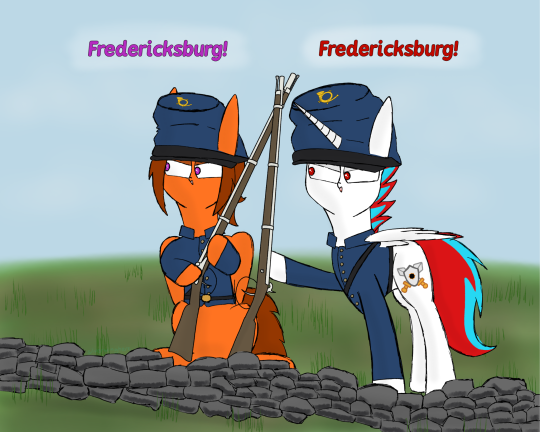
Battle of Gettysburg - Day 3
July 3
3:00 PM
The Confederate Attack Advances to Cemetery Ridge
The Confederates marched out in orderly lines, flags flying ahead of each regiment. For the Union troops atop Cemetery Ridge, it looked like the enemy was prepared to present themselves on the parade ground. However, this was not the parade ground. Soon the slaughter will begin.
Slowly, the Union and Confederate guns opposing one another began to slacken their fire. Eventually, there was a defeaning silence in the field. The bombardment was over, it was now time for the infantry to play its part.
Presenting himself before General Longstreet, Pickett asked inquired if he should advance his division and begin the assault on Cemetery Ridge. Longstreet remained silent. He still did not believe in the plan and knew that his troops would be slaughtered. Unable to say a word, Longstreet merely bowed his head is response.
With that the Confederates began their final preparations for the assault. Meanwhile, on Cemetery Ridge, Union troops dusted themselves off and, recovering themselves after the intense bombardment, readied themselves for the assault many knew would come.
Moving to his division as they prepared to advance, Pickett road along his line, shouting encouragements to his troops. "Charge the enemy, and remember old Virginia!" He told them.
Meanwhile, General Armistead, one of Pickett's brigade commanders, told his troops: "Men, remember your wives, your mothers, your sisters, and your sweethearts!"
All in all, the equivalent of six brigades and three small regiments, numbering around 10,500 Confederate troops, was to attack a ridge defended by just 5,750 Union troops.
At 3:00 in the afternoon the Confederate force advanced. Pickett's division, forming the right wing, stepped off south of Spangler's Woods. Meanwhile, Pettigrew's Brigades, with Trimble's Brigades behind them, formed the left flank and advanced north of Spangler's Woods. In their march, both Pettigrew and Trimble simply had to move east in order to read Cemetery Ridge. Pickett, however, was moving in a south-east direction and would continue to do so until his division reached the Emmitsburg Road, when his division would wheel and begin to move in a north-east direction.
As they advanced, the once concealed Confederate infantry soon came into view of the Union forces at Cemetery Ridge. "Here they come! Here come the Johnnies!" Was the call that rung along the Union position.
Almost immidiately upon coming into view, Union artillery at Little Round top and Cemetery Hill began opening up, firing long-range shots at them. This artillery fire struck the advancing Confederate lines and began to take down troops. It will only get worse as they got closer.
However, despite the long-range shots that were taking down a couple of troops, the overall casualties were still low. So far, the advance was going well. Despite this, Brockenbrough's Confederate Brigade, which formed the left-most line, was begining to faulter. As they continued their advance, the brigade encountered fire from the north, on its left flank. This was the 8th Ohio Regiment, which was advance of the Union line, acting as skirmishers. Instead of falling back, they decided to form up and hold their ground. Now their musketry was hitting Brockenbrough's left flank and when the 8th Ohio decided to charge, Brockenbrough's Confederate Brigade, which was suffering from low morale, broke and fell back.
Despite the loss of a brigade, the Confederate advance continued. However, as they got closer, they soon came into range of the Union artillery's canister shot. Canister shot essentially turned cannons into shotguns. Such fire were often devastating to compact formations - such as the ones the Confederates were in.
Firing canister, Union guns managed to tear holes upon the Confederate lines. Desperately, Confederate officers and NCOs tried to reorganize their troops. "Close up!" They would order. "Close up!"
Despite the devastating effect of the Union artillery, the Confederate lines continued to lurch forward. Meanwhile, Union infantry at Cemetery Ridge laid on the ground and held their fire. "Steady, boys! Hold your positions; don't fire till the word is given; keep cool; lie low until the order is given to fire!"
Kemper's Confederate Brigade, which was the right most brigade of Pickett's Division, was thew first to get close to the Union position at Cememtery Ridge. Once they got within range, the 13th, 14, and 16th Vermont Regiments got up and opned fire. "Make raedy, take good aim, fire low!" Their officers ordered. "Fire!"
The Vermont regiment's volley ripped through Kemper's Brigade. In reaction, the Confederates returned fire.
Meanwhile, Garnett Confederate Brigades was 250 yard from Union positions on the stone wall. At that moment, the troops from Gibbon's Union Division stood up and let loose against them. Firing heavy volleys, they struck the Confederate forces hard, as troops fell in waves. To add to the chaos, Union gunners continued to fire canister shot on them.
North of Garnett's Brigade, Archer's Confederate Brigade encountered an obstable. A post-and-plank fence blocked their way, forcing them to climb it - slowing them down as they too endured musket and canister fire. Farther north, Pettigrew and Davis' Confederates were also being slowed down by a fence, as canister fire riddled them as they approached.
Seeing the Confederates struggle, troops from the 20th Massachusetts Volunteer Infantry Regiment began to taunt them. "Fredericksburg! Fredericksburg!" They cried out. During the battle of Fredericksburg the previous year, Union troops made a disastorous charge against Confederate forces behind a stone wall atop a ridge. Now the tables have turned and the 20th Massachusetts weren't afraid to tell this.
The Confederate advance had temporarily stalled. However, many of the brigades were concentrating in a portion of the Union line known as the Angle - as the stone wall, which ran from north to south, angled to a east to west direction at this point. At this portion of the line, Union troops were the weakest and the line was thin. A concentrated attack there may break the Union defense and ensure victory for the Confederates.
----------------------------------------
Featuring @nopony-ask-mclovin and @asktwilighteclipse as members of the 20th Massachusetts Volunteer Infantry Regiment, as they taunt the advancing Confederate forces.
#nopony-ask-mclovin#asktwilighteclipse#MLP#My Little Pony#Earth Pony#Alicorn#Histroy#Gettysburg#Battle of Gettysburg#Gettysburg 160#Gettysburg 160th Anniversary
22 notes
·
View notes
Text


Today's compilation:
Baby Boomer Classics: Soul Sixties 1985 Soul / R&B / Funk
Well, I mean, if you've never once in your life given any kind of soul music a chance before, then I guess this 60s kit makes for some solid 101 material, because what we have on this thing are a bunch of big deals, like Aretha Franklin, Wilson Pickett, and Otis Redding.
But beyond that, we've got a less rembered gem too, from a guy named J.J. Jackson, whose "But It's Alright" managed to hit #22 on the Billboard Hot 100 in 1966, and then #45 on that same chart again in 1969 after being re-released. And you can't really tell from listening to it, but it's something of a British showcase. Jackson was a New Yorker at the time, but he recorded this song in the UK, and as such, it's one of R&B's first successful hit singles to ever be recorded there. And backing him were some of the country's finest jazz musicians too. Extremely catchy mid-60s guitar riff that guides this one, but the thing that really puts it over the top for me is its dinging vibraphone on the bridge.
And another tune worth mentioning here is one from the always underrated Johnnie Taylor, who is definitely a soul music entity unto himself, but despite being the single-highest selling artist in the history of Stax Records, which is one of the most vital R&B and soul labels that this world has ever known, I still feel like he doesn't get the recognition that he duly deserves. And if you've ever wondered where Queen got the idea for their iconic bass riff on "Another One Bites the Dust," it was probably Johnnie's "Who's Making Love," which used Booker T. & The M.G.'s—of "Green Onions" fame—as its backing band, might've had Isaac Hayes on keyboards, and went to #5 on the Hot 100 in 1968. I haven't found anything official where Queen admits that they derived direct inspiration from this song, but the melodies between them are definitely remarkably similar.
So a bit of a mailed-in cheat code comp here overall for this Baby Boomer Classics series, but a good release nonetheless if the mission was to load up on a bunch of indispensable hits. It's just that not very many selections here do very much to set this comp apart from the countless others that also recount soul and R&B from the 60s.
Only one more of these Baby Boomer Classics comps to go! 😎
Highlights:
Sam & Dave - "Hold On, I'm Comin'" J.J. Jackson - "But It's Alright" Otis Redding - "Try a Little Tenderness" Brenton Wood - "Gimme Little Sign" James & Bobby Purify - "Shake a Tail Feather" Carla Thomas - "B-A-B-Y" Aretha Franklin - "Respect" Wilson Pickett - "Mustang Sally" Doris Troy - "Just One Look" The Watts 103rd Street Rhythm Band - "Do Your Thing" Johnnie Taylor - "Who's Making Love" The Bar-Kays - "Soul Finger"
#soul#soul music#r&b#r & b#r and b#rhythm & blues#rhythm and blues#funk#oldies#music#60s#60s music#60's#60's music
2 notes
·
View notes
Text
“For every Southern boy fourteen years old, not once but whenever he wants it, there is the instant when it’s still not yet two o’clock on that July afternoon in 1863, the brigades are in position behind the rail fence, the guns are laid and ready in the woods and the furled flags are already loosened to break out and Pickett himself with his long oiled ringlets and his hat in one hand probably and his sword in the other looking up the hill waiting for Longstreet to give the word and it’s all in the balance, it hasn’t happened yet, it hasn’t even begun yet, it not only hasn’t begun yet but there is still time for it not to begin against that position and those circumstances which made more men than Garnett and Kemper and Armistead and Wilcox look grave yet it’s going to begin, we all know that, we have come too far with too much at stake and that moment doesn’t need even a fourteen-year-old boy to think This time. Maybe this time with all this much to lose than all this much to gain: Pennsylvania, Maryland, the world, the golden dome of Washington itself to crown with desperate and unbelievable victory the desperate gamble, the cast made two years ago.”
– William Faulkner
#quote #williamfaulkner
6 notes
·
View notes
Text

1. A finales de la década de 1950, Estados Unidos vivió lo que fue llamado una ‘monster craze’ o ‘manía por los monstruos’ debido a que la TV empezó a emitir viejas películas de terror de Universal Pictures.
In the late 1950s, the United States experienced what was called a 'monster craze' because TV began showing old Universal Pictures horror movies.

2. Un libro que explica muy bien este fenómeno es Monster Mash: The Creepy, Kooky Monster Craze In America 1957-1972, escrito por Mark Voger.
A book that explains this phenomenon very well is 'Monster Mash: The Creepy, Kooky Monster Craze In America 1957-1972', written by Mark Voger.
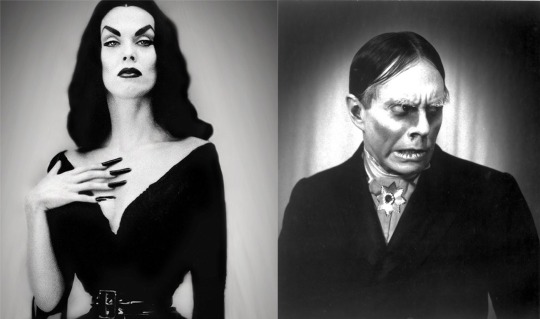
3. En EE.UU. se hicieron famosos los anfitriones de programas que presentaban películas de horror, como Vampira (amiga de Ed Wood) y John Zacherle, entre muchos otros.
Schlock Jocks: 12 of TV’s Coolest Horror Hosts
youtube
4. Era tal la popularidad de los monstruos que el 20 de octubre de 1962 la canción 'Monster Mash', interpretada por Bobby 'Boris' Pickett and the Crypt-Kickers, llegó al puesto #1 de Billboard.
The popularity of the monsters was such that on October 20, 1962 the song 'Monster Mash', performed by Bobby 'Boris' Pickett and the Crypt-Kickers, reached #1 on Billboard.
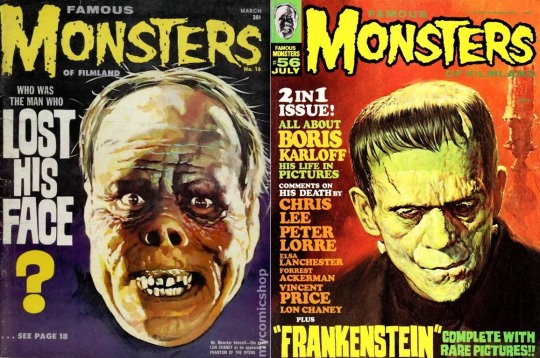
5. La 'Monster Craze' fue impulsada por la revista Famous Monsters of Filmland, lanzada en 1958 y con el legendario Forrest J. Ackerman como editor. Esta revista marcó a gente como Stephen King, Steven Spielberg y Tim Burton, entre otros.
The 'Monster Craze' was fueled by the magazine 'Famous Monsters of Filmland', launched in 1958 with the legendary Forrest J. Ackerman as editor. This magazine influenced people like Stephen King, Steven Spielberg and Tim Burton, among others.
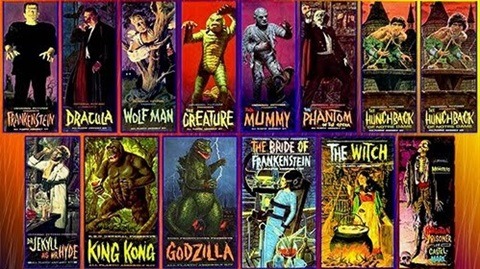
6. Entre los principales anunciantes de Famous Monsters of Filmland estuvo Aurora, fabricante de modelos para armar, que lanzó en 1962 una línea basada en monstruos del cine. Fue un fenómeno de ventas en EE.UU.
Among the main advertisers of 'Famous Monsters of Filmland' was Aurora, a manufacturer of buildable models, which launched a line based on movie monsters in 1962. It was a sales phenomenon in the US.
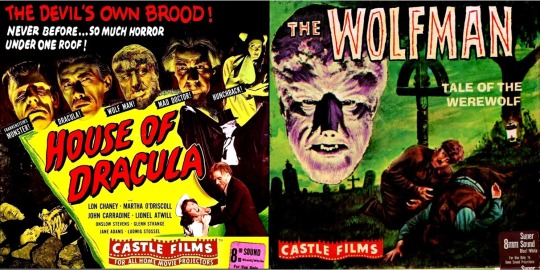
7. En esta era previa a las videograbadoras (VCR), los fanáticos del cine de horror recurrieron a empresas que vendían copias de películas de terror en 8mm para proyectarlas en casa.
In this pre-VCR era, horror film fans turned to companies that sold 8mm copies of horror films to project at home.
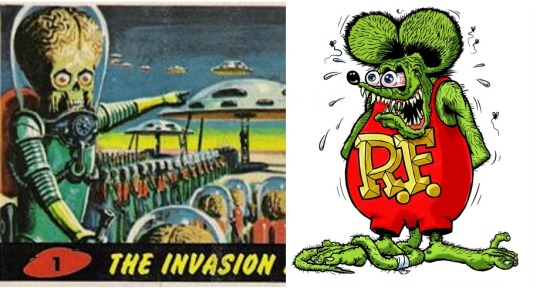
8. Entre los jóvenes se popularizaron las tarjetas coleccionables Mars Attacks, editadas por Topps; y las ilustraciones de Ed 'Big Daddy' Roth para las carreras de aceleración (dragsters).
The 'Mars Attacks' collectible cards, published by Topps, became popular among young people; and was the case with Ed 'Big Daddy' Roth's drag racing illustrations.

9. La 'Monster Craze' estaba tan en auge que la telenovela Dark Shadows (Sombras tenebrosas, 1966-1973) se transformó en un fenómeno global cuando en 1967 introdujo a un vampiro en su historia, Barnabas Collins.
The 'Monster Craze' was so booming that the soap opera 'Dark Shadows' (1966-1973) became a global phenomenon when in 1967 it introduced a vampire in its story, Barnabas Collins.

10. La TV estadounidense aprovechó el 'boom' de los monstros lanzando las series The Munsters (1964-1966) y The Addams Family (1964-1966).
American TV took advantage of the monster boom by launching the series 'The Munsters' (1964-1966) and 'The Addams Family' (1964-1966).
11. Series animadas como 'Los Picapiedra' debieron incluir en 1964 personajes como The Gruesomes, una familia tenebrosa formada por la pareja de Lugubrio y Horripila Horrísono.
Animated series like 'The Flintstones' had to include characters like The Gruesomes in 1964, a dark family formed by the couple Lugubrio and Horripila Horrísono.
#Halloween#Spooky Season#Monster Craze#Vampira#John Zacherle#Monster Mash#The Munsters#The Addams Family#famous monsters of filmland#The Gruesomes#Mars Attacks#Aurora Toy Models#magazine cover#Dark Shadows#Barnabas Collins#bobby boris pickett#Youtube
7 notes
·
View notes
Text
"For every Southern boy fourteen years old, not once but whenever he wants it, there is the instant when it's still not yet two oclock on that July afternoon in 1863, the brigades are in position behind the rail fence, the guns are laid and ready in the woods and the furled flags are already loosened to break out and Pickett himself with his long oiled ringlets and his hat in one hand probably and his sword in the other looking up the hill waiting for Longstreet to give the word and it's all in the balance, it hasn't happened yet, it hasn't even begun yet, it not only hasn't begun yet but there is stll time for it not to begin against that position and those circumstances which made more men than Garnett and Kemper and Armstead and Wilcox look grave yet it's going to begin, we all know that, we have come too far with too much at stake and that moment doesn't need even a fourteen-year-old boy to think This time. Maybe this time with all this much to lose and all this much to gain: Pennsylvania, Maryland, the world, the golden dome of Washington itself to crown with desperate and unbelievable victory the desperate gamble, the cast made two years ago...." William Faulkner, Intruder in the Dust
2 notes
·
View notes